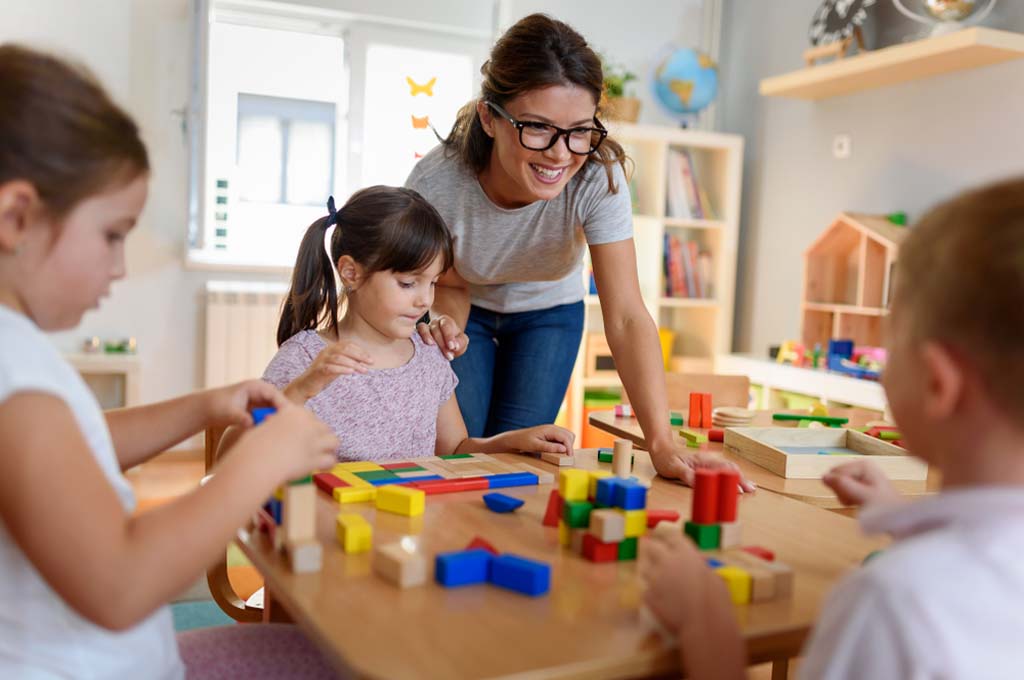Oh, the magic that lives in the preschool mind! While you may sometimes tire of the never-ending stream of questions that fly from the mouths of preschoolers (those children age 3 – 5 years old), this truly is an incredible time of development for them.
Little personalities begin to blossom, bodies grow stronger, and they begin to interact with the world around them—and the preschool environment is an important part of this development. While some may dismiss preschool as glorified babysitting, nothing could be further from the truth. Educators in the preschool world work hard to develop learning plans that improve a child’s development in four critical areas:
-
Language Development
-
Cognitive Development
-
Social Development
-
Physical Development
Language Development
As children move into their preschool years, they begin to communicate using increasingly longer sentences. They can use words to describe how they feel—happy, sad, scared, angry—and begin to understand how to talk about events that happened in the past and those that will occur in the future.
In the preschool environment, students learn much about language development by modeling after their teacher. When a child asks a question using improper grammar “Where he goes?”), the teacher will repeat the same sentence using correct grammar (“Where did he go? He went to the restroom.”).
Reading to children is another wonderful way to help improve language development, but it is equally important to allow children to tell the story…even if they cannot read. Picture books of familiar fairy tales without words give children the freedom to retell a story without the pressure of deciphering letters on a page.
Cognitive Development
Cognitive development refers to the way children interact with the world around them and what they think about it. As they grow, children learn how to solve problems independently, a skill that will serve them well into adulthood.
Teachers are excellent at modeling the problem-solving methodology to children:
Teacher: I see you are looking at that book on the top shelf. What are you thinking?
Child: I want to read it, but I can’t reach it.
Teacher: I see. How could you reach the book?
Child: I could climb the shelf.
Teacher: You could, but you might get hurt if you fall. What’s another idea?
Child: I could use the stool by the hand washing sink.
Teacher: Excellent idea! You are a very good problem solver!
By modeling problem solving skills, teachers help students become more confident in their own problem-solving capabilities. Simple board games or memory games are also great for teaching children how to problem solve.
Social Development
Preschool is the perfect place to learn proper social skills because there are other children to interact with. Knowing how to get along with those outside of your family, to take turns, and to empathise are critical life skills.
Reading is a great way to improve . Through the actions of story characters, children get a clear picture of which actions are “good” and which are “bad”. They can empathize with characters and imagine that experience as if it were their own.
Teachers will also help preschoolers identify their emotions, many of which may be new to the child. Shyness, jealousy, loneliness, or feeling like part of the team are all emotions children can face in a classroom setting. Being able to recognise these emotions is helpful in developing strong social skills.
Physical Development
In preschool, there are plenty of opportunities to engage in activities that improve both gross (large muscle) and fine (small muscle) motor skills.
Gross motor skills use the large muscles of the body: arms, legs, and torso. Games like hopscotch or using tricycles or scooters are great ways to develop gross motor skills.
Fine motor skills use the small muscles in the hands and fingers. Stacking blocks, tracing, putting puzzles together and playing with playdough all help strengthen those small muscles and improve fine motor skills.
Ralph Waldo Emmerson once said, “It’s a happy talent to know how to play” and this is certainly true of preschoolers. While the activities they engage in may initially seem like silly play they are, in truth, the lynchpin for learning. It is through educational-driven play that children learn about the world around them and their place in it.
For any more information, call Clovel Childcare and Early Learning Centre, don’t hesitate to get in touch with us. For any information about our Educational Programs, give us a call at 02 9199 0294 or fill in this contact us form.
Thanks for reading,
Clovel Childcare
1300 863 986











